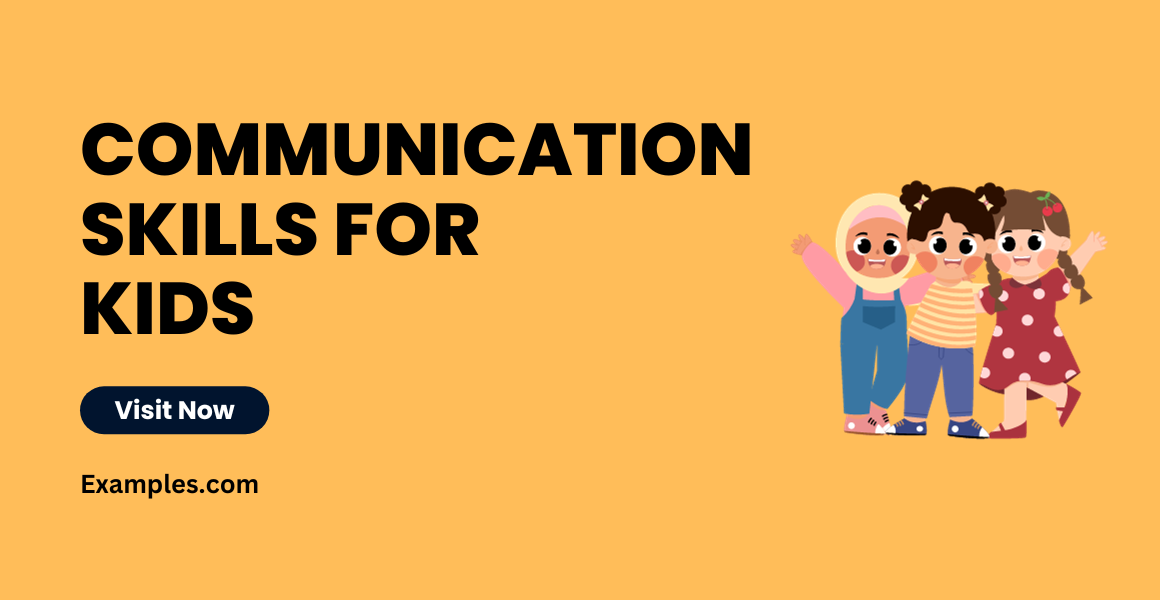29+ Communication Skills for Kids Examples
Developing effective communication skills in early childhood is crucial for a child’s social and emotional development. This guide offers a comprehensive look into fostering essential communication abilities in kids, enriched with practical communication examples. From learning to articulate their thoughts and feelings to understanding and responding to others, these skills lay the foundation for lifelong interpersonal success. Discover strategies and activities that parents and educators can use to nurture these vital skills in a supportive and engaging way.
30 Communication Skills for Kids Examples
Fostering communication skills in children is vital for their social and emotional development. This section provides 30 unique and distinct examples showcasing various communication skills relevant for kids. Each example illustrates practical applications, from expressing feelings to understanding others, and includes example sentences to demonstrate how these skills can be effectively communicated. These scenarios aim to guide children in developing robust interpersonal skills, essential for their growth and interaction with others.
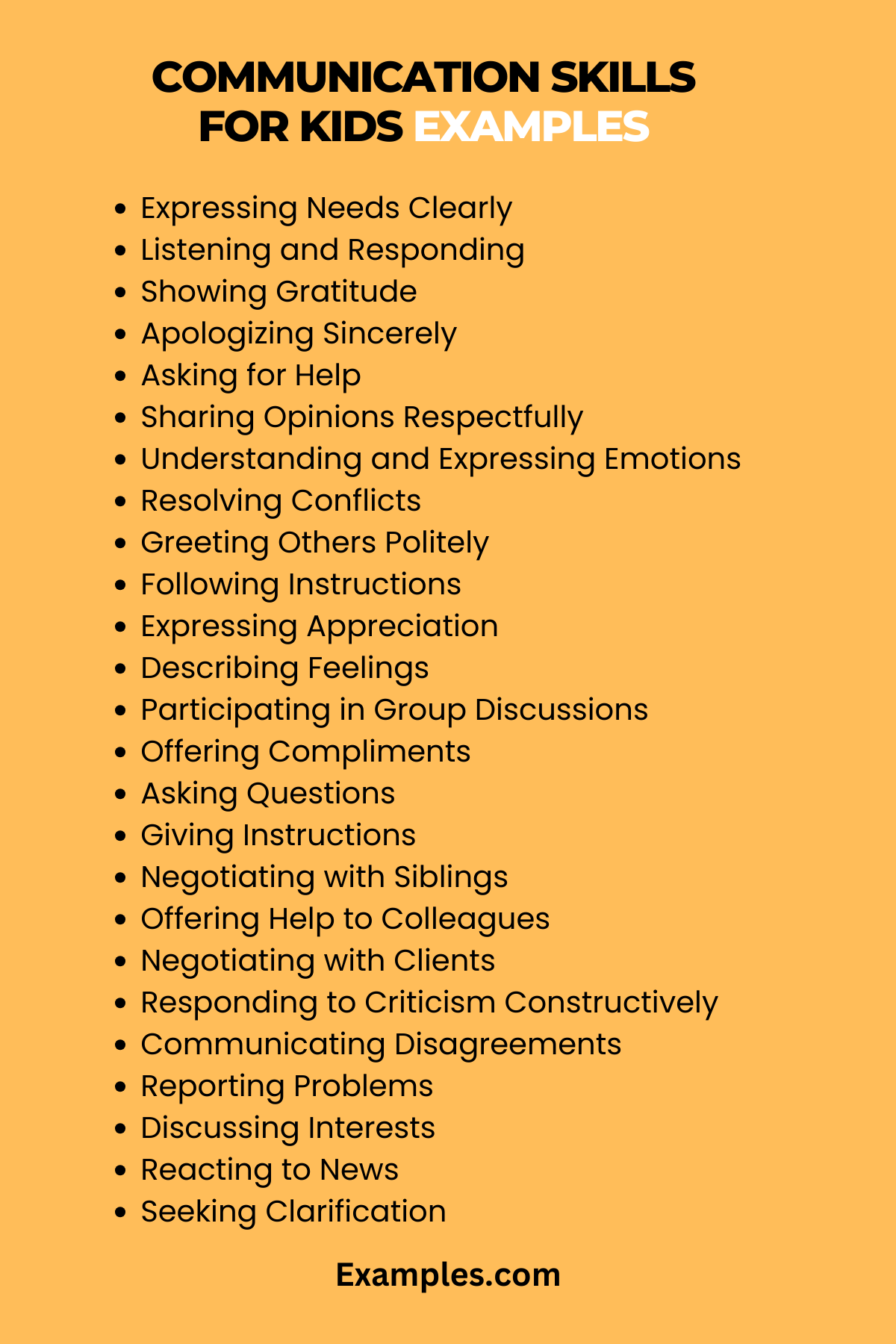
- Expressing Needs Clearly: “Mom, I’m hungry. Can I have a snack?”
Teaches children to communicate their needs directly and politely. - Listening and Responding: In a conversation, a child nods and says, “I understand, you’re saying you lost your toy?”
Encourages active listening and confirms understanding. - Showing Gratitude: “Thank you for helping me with my homework, Dad.”
Instills the importance of expressing gratitude. - Apologizing Sincerely: “I’m sorry I broke your crayon, I didn’t mean to.”
Demonstrates acknowledging mistakes and offering a genuine apology. - Asking for Help: “Teacher, I don’t understand this math problem. Can you explain it again?”
Encourages seeking assistance when needed. - Sharing Opinions Respectfully: “I think the blue paint looks better for our project.”
Shows how to respectfully share personal opinions. - Understanding and Expressing Emotions: “I feel sad when you don’t share your toys with me.”
Helps children identify and express their emotions clearly. - Resolving Conflicts: “Let’s take turns with the game so we both can play.”
Promotes conflict resolution and fair play.
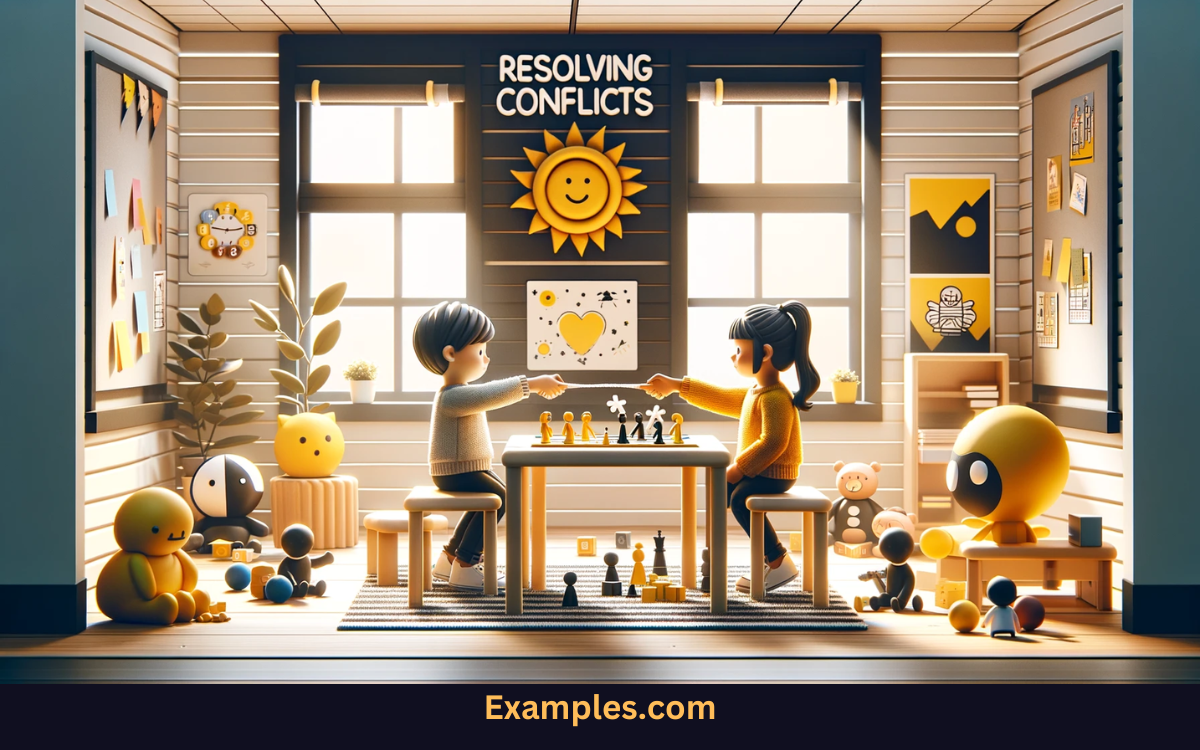
- Greeting Others Politely: “Good morning, Mrs. Smith. How are you today?”
Encourages polite and friendly greetings. - Following Instructions: “I will clean my room first and then do my homework as you asked.”
Demonstrates understanding and following instructions. - Expressing Appreciation: “I loved the story you read to us in class, thank you.”
Encourages expressing appreciation for others’ efforts. - Describing Feelings: “I feel proud when I finish my puzzle all by myself.”
Teaches describing personal feelings about accomplishments. - Participating in Group Discussions: “In the story we read, I liked the part where the rabbit found its way home.”
Promotes participation in group activities and discussions. - Offering Compliments: “You did a great job on your science project!”
Encourages offering positive feedback to peers. - Asking Questions: “Why do birds fly south in the winter?”
Fosters curiosity and the habit of asking questions. - Giving Instructions: “To play this game, first shuffle the cards and then deal them.”
Demonstrates how to give clear instructions. - Negotiating with Siblings: “If you let me play with your toy now, I’ll let you use my skateboard later.”
Teaches negotiation skills among siblings. - Responding to Criticism Constructively: “I’ll try to be more careful next time with my painting.”
Shows how to accept and learn from criticism. - Communicating Disagreements: “I don’t think it’s fair to skip my turn in the game.”
Teaches expressing disagreements in a calm manner. - Reporting Problems: “Miss, someone spilled water in the hallway.”
Encourages reporting issues or problems to an adult.
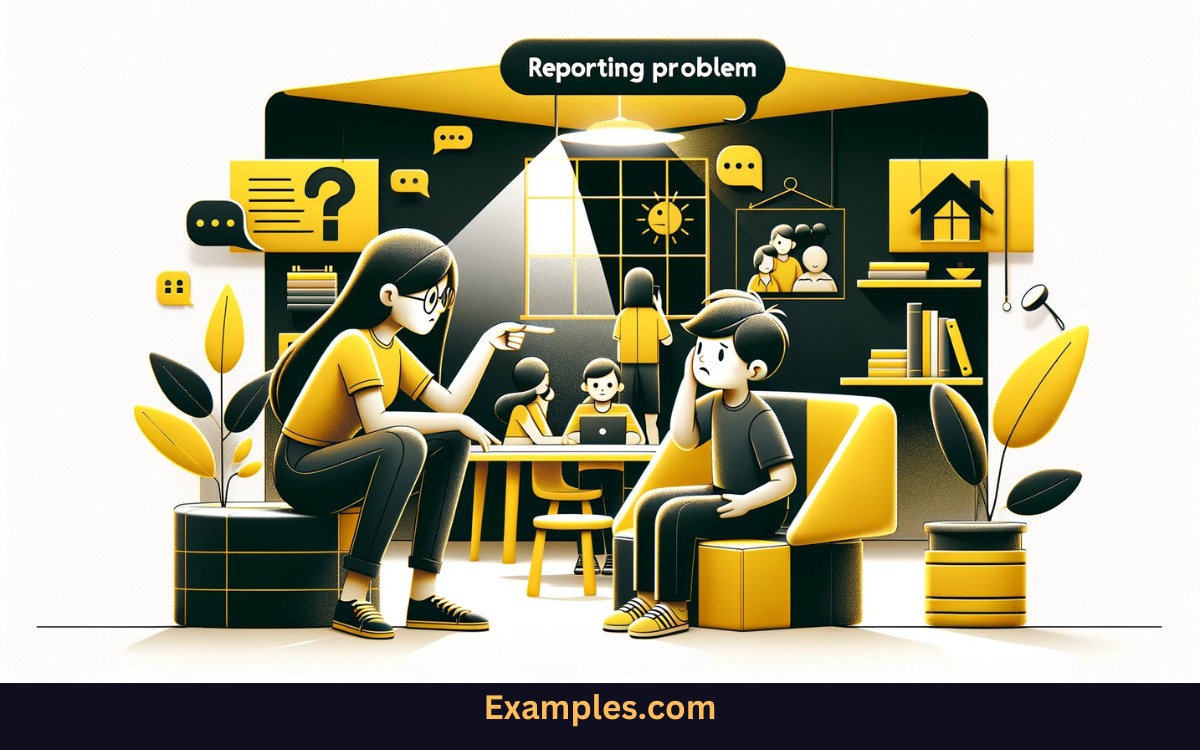
- Discussing Interests: “I love dinosaurs because they are so big and strong.”
Promotes sharing personal interests and passions.
- Reacting to News: “That’s great that you won the drawing competition!”
Demonstrates positive reactions to others’ news. - Seeking Clarification: “I don’t understand the ending of the story. Can you explain it?”
Encourages asking for more information when confused. - Expressing Joy and Excitement: “I’m so excited about our trip to the zoo tomorrow!”
Shows expressing positive emotions like joy and excitement. - Complaining Respectfully: “I feel upset because I always have to clean up our room alone.”
Teaches expressing dissatisfaction in a respectful way. - Encouraging Peers: “You can do it! Just try one more time.”
Promotes offering encouragement and support to friends. - Participating in Storytelling: “Once upon a time, in a land far away, there was a brave knight…”
Encourages creative expression through storytelling. - Communicating in Emergencies: “Help! My friend fell and can’t get up.”
Teaches communicating effectively in emergency situations. - Speaking Up in Class: “I think the answer to the question is 42.”
Encourages speaking up and participating in academic discussions. - Expressing Concern: “Are you okay? You seem sad today.”
Demonstrates showing concern for the well-being of others.
What are Communication Skills for Kids?
Communication skills for kids involve the ability to express thoughts, feelings, and ideas effectively and to understand and respond to the communication of others. These skills are foundational for a child’s overall development and play a crucial role in their ability to interact with the world around them.
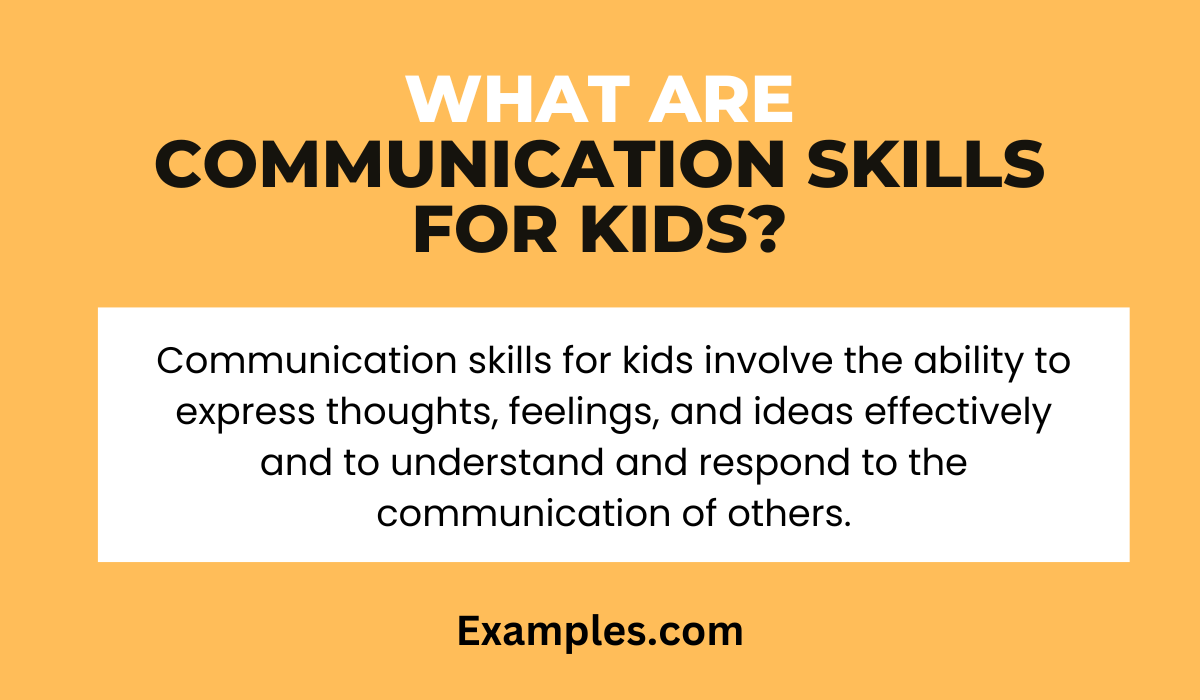
Here’s an in-depth look at the various aspects of communication skills essential for children.
Verbal Communication
- Articulation: Teaching kids how to speak clearly and use age-appropriate language effectively.
- Vocabulary Development: Expanding a child’s vocabulary through reading and conversation to enhance their ability to express themselves.
Listening Skills
- Active Listening: Encouraging children to listen attentively and respond appropriately to what others are saying.
- Understanding and Responding: Helping kids understand verbal instructions and respond suitably, building their comprehension and interaction capabilities.
Non-Verbal Communication
- Body Language Recognition: Teaching kids to interpret and use body language and facial expressions to convey and understand feelings and reactions.
- Eye Contact: Encouraging maintaining appropriate eye contact during conversations to enhance engagement and understanding.
Emotional Expression
- Identifying Emotions: Helping children recognize and name their emotions and express them in socially appropriate ways.
- Empathy Development: Teaching kids to recognize and respond to the emotions of others, fostering empathy and social awareness.
Social Interaction Skills
- Sharing and Taking Turns: Promoting skills like sharing and turn-taking in conversations, essential for social play and learning.
- Respectful Communication: Instilling the value of respectful communication, including polite expressions and listening without interrupting.
Asking Questions
- Curiosity and Inquiry: Encouraging children to ask questions to learn more about their environment and the people around them.
- Clarification Seeking: Teaching kids to ask for clarification if they don’t understand something, enhancing their comprehension skills.
Storytelling and Creative Expression
- Narrative Skills: Developing storytelling skills to enable children to express their thoughts and experiences creatively.
- Imaginative Play: Using imaginative play to help children practice and develop their communication skills in a fun and engaging way.
Problem-Solving Communication
- Conflict Resolution: Guiding children on how to communicate effectively during conflicts or disagreements.
- Solution-Oriented Discussion: Encouraging discussions that focus on finding solutions rather than dwelling on problems.
Digital Communication Awareness
- Appropriate Use: Educating kids on the appropriate use of digital communication tools, like texting and social media, suitable for their age.
- Online Safety: Instilling awareness about online safety and the importance of respectful communication in digital spaces.
Developing these communication skills in children not only aids in their immediate ability to express and connect but also sets the foundation for effective communication as they grow into adulthood. By nurturing these skills, parents and educators can significantly contribute to the holistic development of a child’s social, emotional, and cognitive abilities.
Why is it Important for Kids to Develop Communication Skills?
Developing communication skills in children is crucial for their overall development and future success. Effective communication abilities enable kids to express their thoughts and feelings clearly, fostering self-confidence and self-expression. These skills are essential for forming healthy relationships, resolving conflicts, and excelling academically and socially. Additionally, strong communication lays the groundwork for empathy and understanding, helping children navigate various social situations and understand different perspectives.
Activities of Communication Skills for Kids
Engaging kids in activities that enhance their communication skills can be both fun and educational.
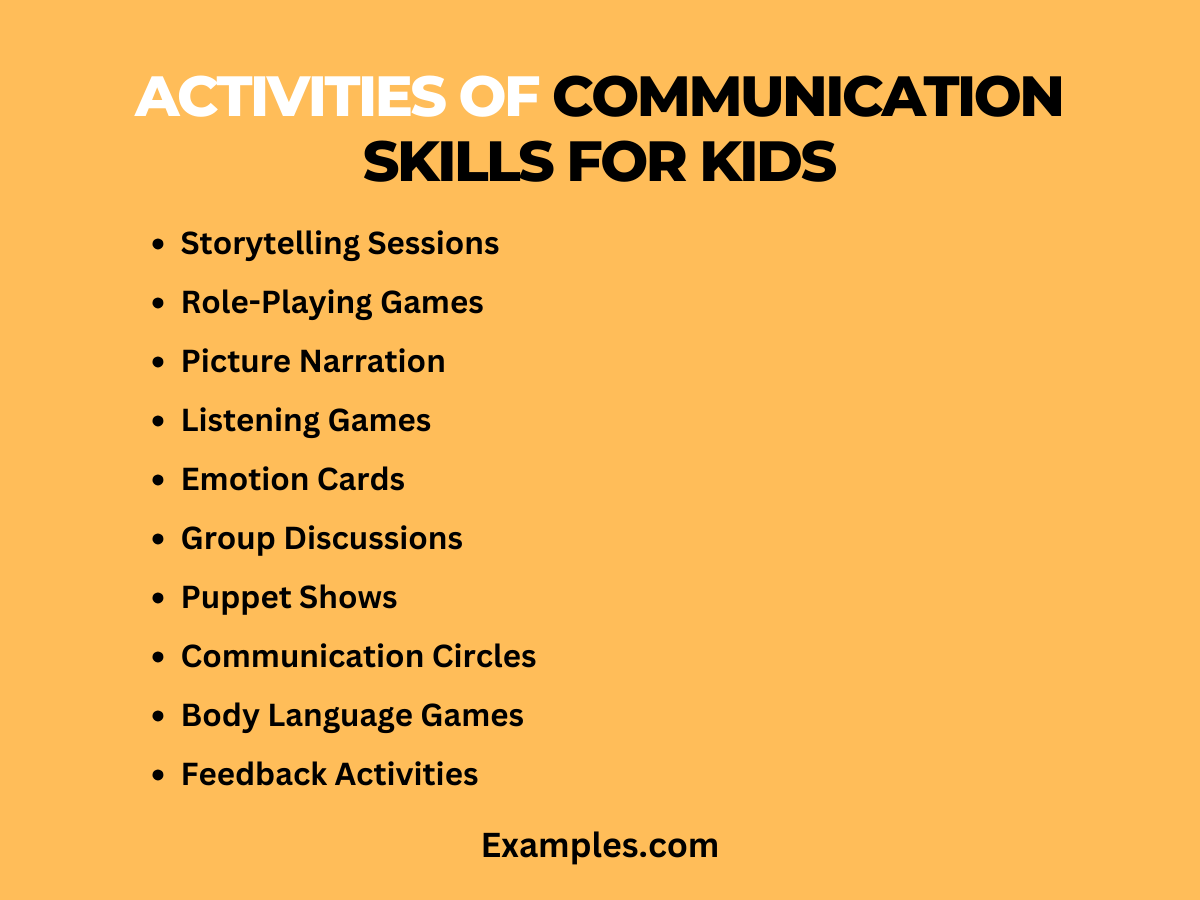
Here are some effective activities:
- Storytelling Sessions: Encourage kids to tell or create stories. This enhances their verbal skills and imagination.
- Role-Playing Games: Act out various scenarios with children, helping them understand different social situations and responses.
- Picture Narration: Show them a picture and ask them to describe what they see. This fosters observation and descriptive abilities.
- Listening Games: Play games that require careful listening, like ‘Simon Says’, to improve their listening skills.
- Emotion Cards: Use cards with different emotions and have children explain times when they felt those emotions.
- Group Discussions: Arrange group discussions on simple topics, helping them learn to express opinions and listen to others.
- Puppet Shows: Create puppet shows that encourage dialogue and interaction.
- Communication Circles: Sit in a circle and share stories or discuss topics, enhancing group communication dynamics.
- Body Language Games: Teach kids about non-verbal communication through games that involve interpreting body language.
- Feedback Activities: Teach children how to give and receive constructive feedback in a positive manner.
These activities not only improve communication skills but also contribute significantly to the personal and social development of kids.
How to Work on Communication Skills with Kids?
Working on communication skills with kids is key to helping them express themselves and understand others. Here are some straightforward methods to enhance these skills:
Start with Basic Conversations
- Encourage regular simple conversations. Ask about their day or feelings.
- Use open-ended questions to stimulate more than yes/no answers.
Practice Active Listening
- Show you’re listening by nodding and giving them your full attention.
- Reflect back what they say, confirming understanding.
Model Effective Communication
- Be a role model in how you communicate with others.
- Use clear, respectful language and appropriate tone.
Use Storytelling and Role-Play
- Engage in storytelling to build narrative skills.
- Use role-play to practice different social scenarios.
Teach Non-Verbal Communication
- Discuss the importance of body language and facial expressions.
- Play games to guess feelings from non-verbal cues.
Encourage Empathy
- Talk about understanding others’ feelings.
- Role-play to experience different perspectives.
Make It Fun
- Use games and activities that require communication.
- Praise their efforts to make learning enjoyable.
How to Teach Kids Communication Skills?
Teaching communication skills to kids involves interactive and engaging methods:
Use Age-Appropriate Language
- Speak in a way that’s easy for them to understand.
- Avoid complex jargon or abstract concepts.
Build Vocabulary
- Introduce new words in context.
- Read together and discuss unfamiliar words.
Develop Listening Skills
- Play listening games like ‘Simon Says’.
- Practice following multi-step instructions.
Encourage Expression of Feelings
- Create a safe space for them to express emotions.
- Use art or writing as alternative expression forms.
Teach Conversation Etiquette
- Discuss the importance of taking turns while talking.
- Practice saying ‘please’, ‘thank you’, and ‘excuse me’.
Foster Social Interaction
- Arrange playdates or group activities.
- Encourage participation in group discussions or team sports.
Handle Miscommunication
- Teach them it’s okay to ask for clarification.
- Show how to apologize and make amends.
By incorporating these methods into daily routines, kids can develop strong communication skills that will benefit them throughout their lives. Remember, patience and consistent practice are key to helping children learn and grow in their ability to communicate effectively.
How to Improve a Kid’s Communication Skills?
Enhancing a child’s communication skills is pivotal for their overall development. Here are some practical and effective ways to boost these skills:
Encourage Open Conversation
- Daily Check-ins: Have regular, casual conversations about their day. This encourages kids to articulate their experiences and feelings.
- Interest-Based Topics: Discuss topics they show interest in, which helps them express themselves more freely.
Model Good Communication
- Lead by Example: Use clear, respectful language and active listening in your interactions, setting a positive example.
- Express Emotions: Show them how to express emotions in words, teaching them emotional vocabulary.
Read Together
- Story Time: Reading aloud together helps in vocabulary building and understanding language nuances.
- Discuss the Story: Ask questions about the story to develop their comprehension and critical thinking.
Practice Active Listening
- Show Interest: Listen attentively to what they say, showing that their words matter.
- Reflect and Clarify: Echo back what they say or ask clarifying questions to enhance understanding.
Engage in Play
- Role-Playing Games: Encourage role-play activities, which help them practice different communication scenarios.
- Interactive Games: Games that require verbal interaction can improve their speaking and listening skills.
Use Technology Wisely
- Educational Apps: Utilize apps designed to improve language and communication skills.
- Limit Screen Time: Ensure screen time doesn’t replace face-to-face interaction, crucial for developing social skills.
Teach Non-Verbal Communication
- Body Language Awareness: Teach them about facial expressions, gestures, and body language.
- Emotion Recognition: Help them understand and interpret the non-verbal cues of others.
Foster Social Interactions
- Playdates: Arrange playdates with peers to practice social communication.
- Group Activities: Enroll them in group activities like sports or arts to interact with others.
Provide Positive Reinforcement
- Encourage Efforts: Praise their attempts to communicate, even if imperfect.
- Constructive Feedback: Offer guidance on how to improve in a positive and supportive manner.
Create a Safe Space
- Non-Judgmental Environment: Create an environment where they feel safe to express themselves without fear of judgment.
- Patient Responses: Always respond with patience and understanding, encouraging open dialogue.
Improving a child’s communication skills is a gradual and ongoing process. By providing these supportive experiences, parents and educators can significantly aid in the development of effective communication abilities in children.
Tips for Effective Communication Skills for Kids
Here are some focused tips to further enhance communication skills in children:
Practice Patience
- Wait for Responses: Give them time to form their thoughts and respond, showing patience in conversations.
- Avoid Interrupting: Teach them the importance of not interrupting while someone else is speaking.
Use Age-Appropriate Language
- Simple Vocabulary: Use words and phrases that are easy for them to understand and replicate.
- Clear Instructions: Provide instructions in a straightforward manner to avoid confusion.
Encourage Expressive Activities
- Art and Writing: Encourage activities like drawing or writing, which can be alternative forms of self-expression.
- Music and Dance: These activities can also enhance their ability to express emotions and ideas.
Foster Empathy
- Understanding Others: Teach them to consider others’ feelings and perspectives.
- Empathetic Responses: Encourage them to respond to others with empathy and understanding.
Develop Public Speaking Skills
- Show and Tell: Activities like show and tell at school help build confidence in speaking in front of others.
- Speaking Opportunities: Provide opportunities to speak in gatherings, enhancing their public speaking skills.
By incorporating these tips and practices, children can develop robust communication skills that will aid them in their academic journey, social interactions, and personal growth.



